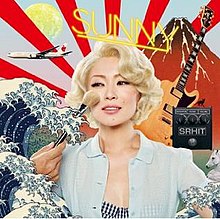Hi Izuru Tokoro
| Hi Izuru Tokoro | ||||
|---|---|---|---|---|

Regular edition cover.
|
||||
| Studio album by Ringo Sheena | ||||
| Released | November 5, 2014 | |||
| Recorded | 2009–2014 | |||
| Genre | ||||
| Length | 50:05 | |||
| Language |
|
|||
| Label | EMI Records Japan (Virgin Records) | |||
| Producer | Ringo Sheena | |||
| Ringo Sheena chronology | ||||
|
||||
| Singles from Hi Izuru Tokoro | ||||
|
||||
Hi Izuru Tokoro (日出処?, "Land of the Rising Sun"), also known by its English name Sunny, is an album by Japanese musician Ringo Sheena released on November 5, 2014 by Universal Music Japan sublabel Virgin Records. It is a compilation studio album compiling singles released since 2009 as well as new compositions.
Before the release of her fourth album Sanmon Gossip in 2009, which celebrated her 10th anniversary, Sheena released the single "Ariamaru Tomi", used for the drama Smile's theme song. Sheena's main musical project during this time was the band Tokyo Jihen, who after Sanmon Gossip released the albums Sports (2010) and Dai Hakken (2011). 2011 saw the release of another solo single by Sheena, "Carnation". The song was commissioned for the asadora Carnation starring Machiko Ono. Sheena had wanted the song to be released by Tokyo Jihen, however the staff involved with the drama specifically requested the song be under her solo stage name. Sheena compromised by having the members of Tokyo Jihen perform the song with her and appear in the music video, however still labelling it as a 'Ringo Sheena' release.
In 2011, Tokyo Jihen made the mutual decision to split up, and in 2012 released an extended play called Color Bars, and performed a farewell tour Bon Voyage. After the tour had finished, Sheena released a digital single "Jiyū e Michizure", the theme song for the drama Ataru. In 2013, Sheena began a year of celebration for the 15th anniversary since her debut. This began with the single "Irohanihoheto" / "Kodoku no Akatsuki" in May, two albums released on November 13, 2013: Ukina, a collaboration compilation album and Mitsugetsu-shō, a live compilation album, and ended with Gyakuyunyū: Kōwankyoku, a self-cover album of songs Sheena had written for other musicians.
...
Wikipedia
